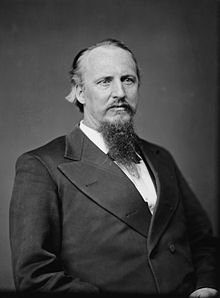Francis M. Cockrell
| Francis Cockrell | |
|---|---|
 |
|
|
United States Senator from Missouri |
|
|
In office March 4, 1875 – March 3, 1905 |
|
| Preceded by | Carl Schurz |
| Succeeded by | William Warner |
| Personal details | |
| Born |
Francis Marion Cockrell October 1, 1834 Warrensburg, Missouri |
| Died | December 13, 1915 (aged 81) Washington, D.C. |
| Political party | Democratic |
| Military service | |
| Allegiance |
|
| Service/branch |
|
| Years of service | 1861–1865 (CSA) |
| Rank |
|
| Unit | 1st Missouri Infantry Regiment |
| Commands |
2nd Missouri Infantry Regiment Cockrell's Brigade French's Division |
| Battles/wars | American Civil War |
Francis Marion Cockrell (October 1, 1834 – December 13, 1915) was a Confederate military commander and American politician from the state of Missouri. He served as a United States Senator from Missouri for five terms. He was a prominent member of the famed South–Cockrell–Hargis family of Southern politicians.
Cockrell was born in Warrensburg, Missouri, the son of Nancy (Ellis) and Joseph Cockrell, the sheriff of Johnson County. His older brother was Jeremiah Vardaman Cockrell, who was a congressman from Texas in the 1890s. Francis Cockrell attended local schools and Chapel Hill College in Lafayette County, Missouri, graduating in July 1853; He studied law and was admitted to the bar in 1855, practicing law in Warrensburg until the outbreak of the Civil War.
Cockrell was married three times. His first wife, Arthusa D. Stapp, with whom he had three sons, died in 1859. His second wife, Anna E. Mann of Kentucky, died of consumption in 1871. In July 1873, he married Anna Ewing, the eldest daughter of Judge Ephraim Brevard Ewing from Missouri.
At the beginning of the American Civil War in 1861, the militia officer joined the Missouri State Guard as a Captain. After being mustered into the Confederate States Army he briefly served in the 1st Missouri Infantry Regiment before tranferring to the 2nd Missouri Regiment in early 1862; being promoted to colonel. Cockrell commanded a brigade in the Vicksburg Campaign and was wounded in the hand by an exploding shell during the Siege of Vicksburg. He distinguished himself at the Battle of Champion Hill, launching a counterattack that temporarily ousted troops of XVII Corps off the hill. He also took part in the Battle of Big Black River Bridge. His brigade was able to escape just before federal troops seized the bridge.
...
Wikipedia
